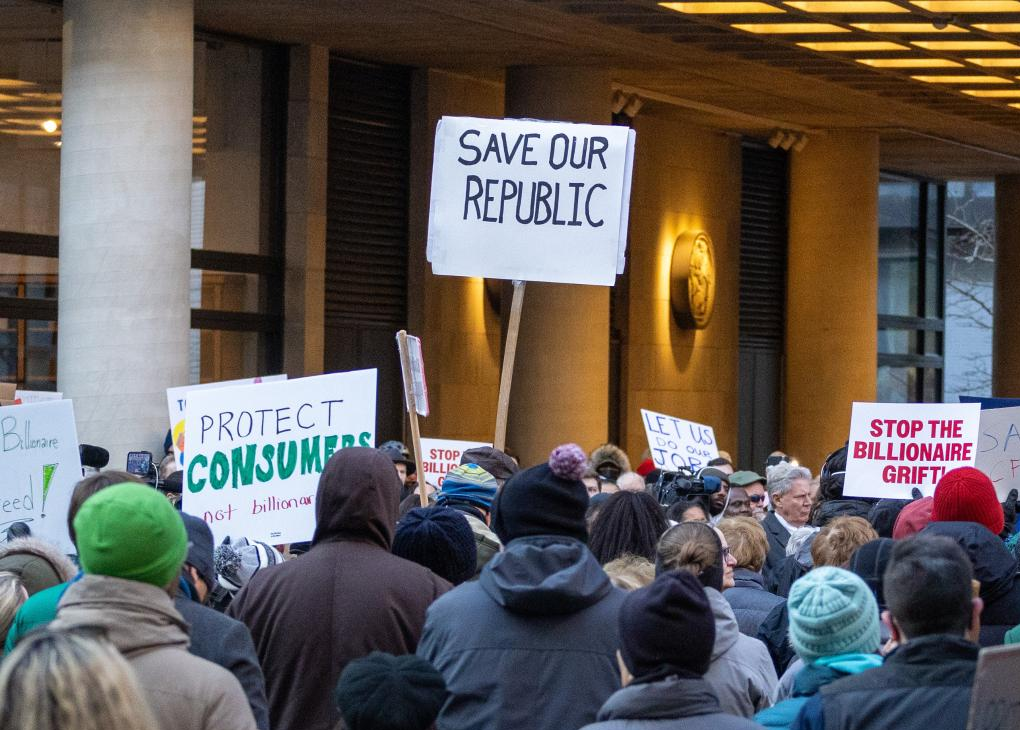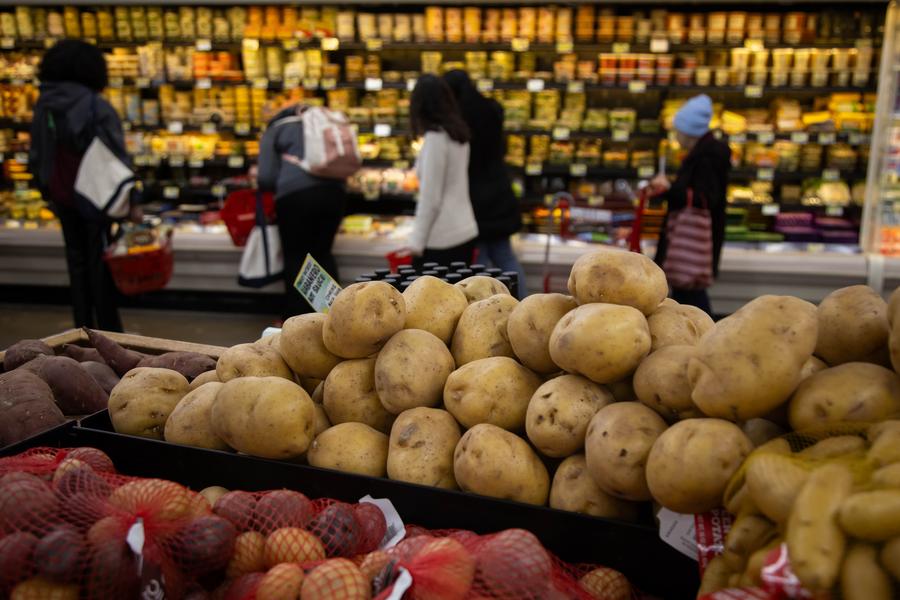Trump’s War Against American Labor and Global Workers

Rather than improving living standards for the U.S. working class, the tariff policy will significantly increase the cost of essential goods, and thrust the U.S. economy into a recessionary spiral.
The U.S. imposing full-scale tariffs is part of U.S. President Donald Trump’s agenda that seeks to expand its hegemony worldwide, subordinate developing countries to its imperialist will, and purportedly “Make America Great Again.”
Trump declared the imposition of tariffs on April 2 as “Liberation Day” for Americans. However, his policy is, in reality, a declaration of war against the U.S. working class, which relies on free trade for both job security and its high standard of living relative to the world. Trump promises to bring jobs back to the U.S., paying no attention to the fact that U.S. unemployment rates are at their lowest levels in more than 30 years, hovering between 3 and 4 percent. Just before the tariffs were imposed, the U.S. Bureau of Labor Statistics reported that the country had created 228,000 jobs in March alone, nearly doubling economists’ predictions.
While Trump predicts his tariff policy will improve the standard of living of the American working class, the tariffs are more likely to plunge American workers into joblessness and economic hardship as businesses close down and inflation climbs sharply. Rather than “Liberation Day,” April 2, 2025, is likely to be remembered as “Depression Day.” Not since the Smoot-Hawley Tariff Act of 1930 has the U.S. Government so foolishly threatened the economic security of American workers.
Higher unemployment rate
In March, the Conference Board, a U.S. business research organization, released its Consumer Confidence monthly index, disclosing that just the threat of tariffs had eroded consumer confidence by 7.2 points. Worse, its Expectations Index, measuring consumer prospects for income, business and labor market conditions, declined by nearly 10 points to 65.2, the lowest level in 12 years. Fears of a deep recession are already unfolding as high inflation reduces demand for basic necessities. This decline in sales in turn leads to higher rates of unemployment .
Even before the latest imposition of tariffs, Trump displayed a hypocritical contempt for the U.S. working class by cutting federal government jobs with the support of Elon Musk through the Department of Government Efficiency (DOGE). The department has already proposed privatization and deep cuts to social security, the federal postal system and environmental protection—services and programs that are indispensable to the working class. More than 85,000 federal workers lost their jobs in two months. The U.S. Government’s lack of respect for its own employees is likely to provoke fear among all workers.

In the wake of the absurd
April 2 “Liberation Day,” businesses are factoring in prohibitive costs of imported goods and preparing to fire workers. Parts shortages have already interrupted supply chains for Stellantis and Jeep in the U.S. The very industries that Trump is promoting as beneficiaries of his tariffs, are already laying off workers, as components for electronics, appliances, automobiles and beyond are unaffordable to suppliers and producers. As sales plummet due to the astronomical tariffs, jobs are being cut as U.S. businesses prioritize profits over their workers.
Higher living costs
Since the 1980s, the U.S. working class have been beneficiaries of free trade, which has increased their purchasing power for quality consumer goods from East Asia, Southeast Asia and beyond. Workers stand to bear the most cost from Trump’s tariff policy through significant increases to the cost of these essential goods. In addition, the U.S. Government and courts have effectively prevented U.S. workers from joining unions, contributing to wage stagnation. Tariffs will only decrease working class’s ability to purchase essential and innovative consumer goods that have sustained their high standards of living.
Tariffs threaten the comfortable living stands of American workers who have benefited from quality and affordable goods produced overseas. Rather than improving living standards for the U.S. working class, the tariff policy will significantly increase the cost of essential goods, including clothing, electronics, automobiles, and thrust the U.S. economy into a recessionary spiral. U.S. imperialism and extortion have exploited foreign workers for over 30 years by outsourcing to the Global South. In reality, what Trump’s economic advisor for trade Peter Navarro characterizes as “sweatshops” and “pollution that… morally and environmentally stain the global landscape from Asia and Africa to Latin America” lines the pockets of U.S. capitalists and provides cheap products to U.S. workers. Today, the U.S. remains the richest country in the world and profits through its imperialist and predatory economic policies.
Higher inflation
By unilaterally imposing a tariff regime, imports will decline, as will sales, which will significantly raise U.S. unemployment. Trump is imposing tariffs that will force corporations to lay off workers and raise inflation for essential commodities, including food, energy, electronics and transportation. In the wake of Trump’s so called “Liberation Day,” private businesses are laying off workers as tariffs are making foreign parts and supplies unaffordable for key components in electronics, automobiles and beyond. As sales plummet due to a shortage of goods, American businesses will not invest in manufacturing industries employing high-wage workers, especially in steel, aluminum and consumer goods.

The U.S. share of global wealth has grown significantly over the past 35 years of neoliberal capitalism. U.S. employees are the highest paid in the world. But the U.S. also has the highest rate of inequality among developed countries as the upper classes have extracted high rate of surplus value at the expense of the working class. Now, the U.S. working class will no longer gain access to foreign imports. Imposing extreme tariffs will contribute to prohibitive inflation and reduce the standards of living for the working class and most vulnerable Americans. Raising import duties will not bring back jobs as capital investments do not flow to manufacturing, but to firms at the top of global supply chains which outsource work to the lowest-wage workers producing garments, electronics and appliances.
Trump’s tariffs may distract workers from poverty and inequality in the U.S., but excessive foreign tariffs will punish workers even more through raising costs for essential consumer goods. High-wage jobs will not be created as the Trump administration seeks to develop basic industry at the bottom of the global production chain. Producing steel offers far fewer profits than semiconductors.
The Trump administration’s lawless policies will lead to growing inflation and widen the gap and contribute to job loss and high rates of unemployment. Tariffs create lower consumption that will lead to a contraction in jobs and high unemployment at a time when the U.S. has had low jobless rates.
Statistics demonstrate, while the U.S. is the largest economy with highest GDP per capita of any major nation, the capitalist class controls the vast majority of wealth and has the highest disparity of income among major nations. According to the World Inequality Report, the average national income of the adult population in the U.S. was the highest of all major countries, and wages have grown as trade has expanded. But the bottom 50 percent of U.S. wage earners receive just over $20,000 per person per year. The top 10 percent of American wage earners earn 17 times the average wage, more than $350,000 per person per year—far higher than in any other country. These wage disparities will expand considerably as tariffs shift production away from the U.S. and unemployment rates rise.
The author is chair of the U.S. Peace Council, a professor of Political Science at the City University of New York, Brooklyn, and editor-in-chief of the Journal of Labor and Society, a quarterly peer-review social science publication founded in 1997.
 Facebook
Facebook
 Twitter
Twitter
 Linkedin
Linkedin
 Google +
Google +










